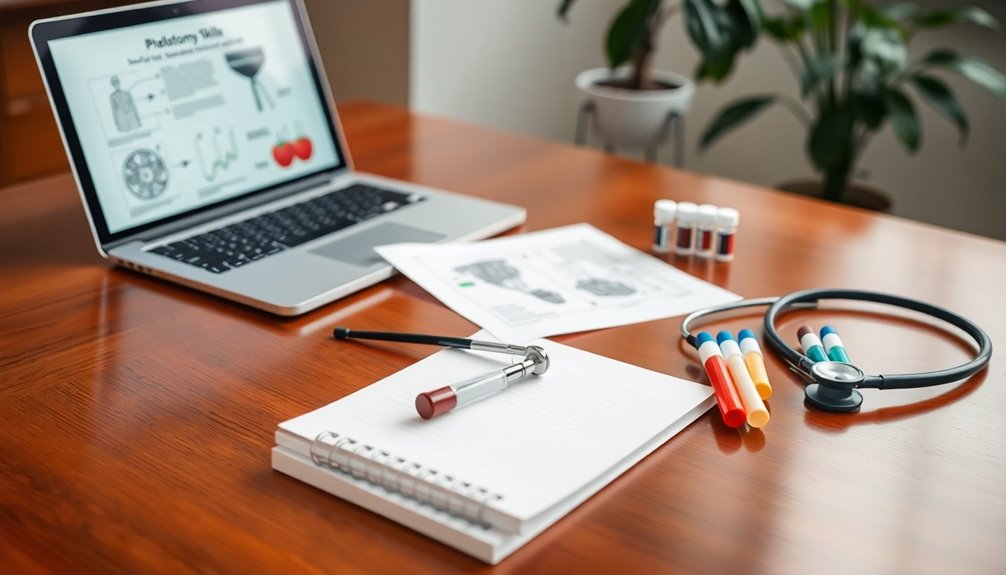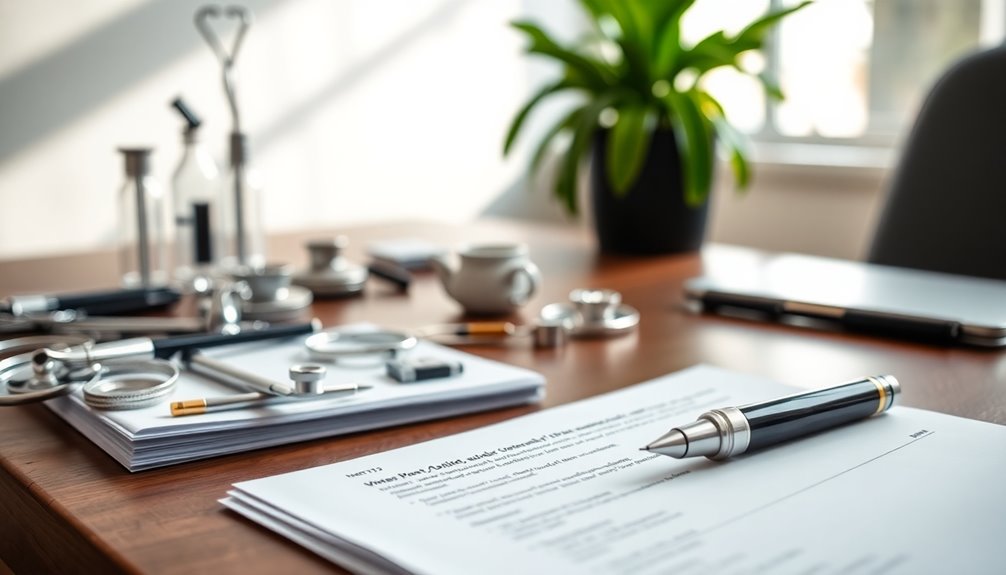To ace your master phlebotomist interview, it's essential to prepare for key questions that highlight your skills and experience. You'll likely discuss techniques for venipuncture, managing anxious patients, and safety protocols you follow. Employers want to see your compassion, attention to detail, and problem-solving abilities. Practice answering specific scenarios and prepare insightful questions to show your interest in the role. Dressing professionally is a must to make a strong first impression. As you gear up for your interview, there's plenty more to discover about crafting your responses and showcasing your expertise effectively.
Key Takeaways
- Highlight your experience with various venipuncture techniques and how they ensure accurate blood collection.
- Discuss strategies for calming anxious patients and managing difficult situations during blood draws.
- Emphasize your knowledge of safety protocols and infection control measures in phlebotomy.
- Provide specific examples of how you maintain attention to detail and accuracy in your work.
- Prepare thoughtful questions about the healthcare facility's values and expectations for phlebotomists.
Understanding the Phlebotomist Role

As a phlebotomist, you play an essential role in the healthcare system by drawing blood for tests, transfusions, or donations. Your expertise guarantees that accurate samples are collected, which are fundamental for diagnosing and treating patients.
You often work in hospitals, clinics, or laboratories, interacting with a diverse range of patients. Certification is typically required, emphasizing your knowledge of proper techniques and safety protocols.
The demand for phlebotomists is growing, with an expected 22% increase in employment from 2020 to 2030. With an average salary around $36,000 per year, your role is both rewarding and imperative in maintaining patient health and safety.
Your skills directly impact patient care and contribute to the overall effectiveness of healthcare services.
Preparing for the Interview

Preparing for your phlebotomist interview involves several key steps that can greatly enhance your chances of success.
Start by researching the healthcare facility's values and mission to align your answers with their culture. Review essential phlebotomy techniques and protocols to demonstrate your expertise.
Practice your responses to common interview questions, ensuring you articulate your experience clearly. It's also vital to prepare insightful questions to ask the interviewer, showing your genuine interest in the role.
Don't forget to dress professionally; first impressions matter.
Finally, consider doing mock interviews to boost your confidence and refine your communication skills, making you more comfortable when discussing your qualifications.
Taking these steps will set you up for a successful interview experience.
Key Interview Questions

When you enter a phlebotomist interview, expect to face a range of key questions that assess your skills, experience, and fit for the role.
You'll need to demonstrate your knowledge and ability to handle various situations. Here are three essential questions you might encounter:
- Can you explain your experience with venipuncture techniques?
- How do you handle patients who are anxious or uncooperative?
- What safety protocols do you follow during blood draws?
These questions aim to evaluate not just your technical skills but also your interpersonal abilities.
Be prepared to provide specific examples from your past work that showcase your expertise and approach to patient care.
Assessing Background and Experience

Evaluating your background and experience is essential during a phlebotomist interview, as it helps the interviewer gauge your qualifications and readiness for the role. Expect questions about your training, previous experiences, and how you handle various patient situations. Be prepared to discuss your techniques for drawing blood and working with diverse patient demographics. Understanding the importance of safety protocols can also enhance your credibility as a candidate.
| Area of Experience | Key Skills | Relevant Examples |
|---|---|---|
| Blood Draw Techniques | Venipuncture skills | Successfully drawing from difficult veins |
| Patient Interaction | Communication skills | Calming anxious patients |
| Conflict Resolution | Problem-solving | Managing difficult patients |
| Safety Protocols | Adherence to standards | Implementing sanitation practices |
| Diverse Environments | Adaptability | Working in various healthcare settings |
Essential Phlebotomist Traits

Successful phlebotomists embody several essential traits that enhance their effectiveness in patient care and blood collection.
These traits not only improve the blood-drawing experience but also foster trust with patients.
Here are three key traits you should cultivate:
- Compassion: A caring demeanor helps ease patient anxiety and builds rapport, making the process smoother for everyone involved.
- Attention to Detail: Precision in blood collection guarantees accurate results and minimizes the risk of errors, which is critical in healthcare settings.
- Strong Communication Skills: Clear communication is fundamental for explaining procedures and addressing patient concerns, fostering cooperation and understanding.
Managing Patient Interactions

Effective management of patient interactions is essential for phlebotomists, as it directly influences the overall experience and comfort level of those you're serving. You need to employ techniques like active listening, demonstrating empathy, and maintaining professionalism during difficult situations. Using calming techniques can help ease patient anxiety, making the blood draw process smoother.
| Technique | Purpose |
|---|---|
| Active Listening | Understand patient needs |
| Empathy | Build trust and rapport |
| Calming Techniques | Reduce anxiety |
| Professionalism | Maintain respect and trust |
Required Technical Skills

Proficiency in technical skills is vital for phlebotomists, as it guarantees safe and accurate blood collection.
You'll need to master several key abilities to excel in this role:
- Venipuncture Techniques: Knowing how to properly locate veins and perform blood draws minimizes discomfort and risk for patients.
- Infection Control Protocols: Understanding safety measures, including the use of personal protective equipment, guarantees a sterile environment and protects both you and the patients.
- Lab Equipment Familiarity: Being skilled with tools like centrifuges and blood collection devices is essential for efficient operations and quality control.
These skills not only enhance your competency but also build trust with patients and contribute to successful healthcare outcomes.
Emotional Intelligence Importance

Understanding emotional intelligence is essential for phlebotomists, as it directly impacts patient interactions and overall care quality. By recognizing and managing emotions—both your own and your patients'—you can create a more comfortable environment for blood draws.
Empathy plays a significant role in easing patient anxiety, allowing you to build rapport and trust. When you actively listen and respond to patients' emotional needs, you enhance their experience and improve outcomes.
Additionally, being emotionally aware helps you remain calm under pressure, which is critical during challenging situations. Continuously developing your emotional intelligence skills not only benefits your patients but also fosters a positive work atmosphere, making you a more effective phlebotomist in the long run.
Career Advancement Opportunities

Emotional intelligence not only enhances your interactions with patients but also opens doors for career advancement in phlebotomy. By cultivating strong relationships and understanding patient needs, you position yourself for growth. Additionally, developing your cultural intelligence can further improve your ability to connect with diverse patient populations and enhance your professional reputation.
Here are three key opportunities for advancement:
- Specialization: You can pursue certifications in areas like blood banking or pediatric phlebotomy, making you a sought-after expert.
- Leadership Roles: With experience, you might move into supervisory positions, guiding new phlebotomists and improving team dynamics.
- Further Education: Consider advancing your education to become a nurse or lab technician, expanding your skill set and career options.
Embrace these opportunities, and you'll enhance your professional journey in the healthcare field.
Safety Practices in Phlebotomy

Safety is paramount in phlebotomy, as it guarantees both patient and practitioner well-being during blood collection procedures. You must adhere to strict safety protocols to minimize risks.
Always wear appropriate personal protective equipment (PPE), including gloves and masks, to protect yourself and your patients. Proper hand hygiene is essential; wash your hands before and after each procedure.
Make sure that you're familiar with the equipment and follow the correct procedures for blood draw techniques. Be aware of the proper disposal methods for sharps and biohazard materials to prevent contamination.
Stay updated on industry safety standards and participate in regular training sessions. By consistently prioritizing safety, you not only protect those you serve but also enhance your professional credibility.
Frequently Asked Questions
What Inspired You to Pursue a Career in Phlebotomy?
When you think about what inspired you to pursue phlebotomy, it's often a mix of wanting to help others and the excitement of working in healthcare.
You might've experienced a personal connection, like assisting a loved one during a medical procedure.
The thought of making a difference by ensuring accurate blood collection and patient comfort could've driven you to this fulfilling career path.
It's about compassion and dedication to patient care.
How Do You Handle Difficult Coworkers in a Clinical Setting?
In a busy clinical setting, tensions can rise, and you might face difficult coworkers.
You take a deep breath, staying calm as you approach them. You listen actively to their concerns, showing empathy.
By addressing issues directly and respectfully, you open a dialogue. If needed, you involve a supervisor, ensuring the team remains focused on patient care.
Finally, you maintain professionalism, knowing that teamwork's essential for success in phlebotomy.
Can You Describe a Time You Learned From a Mistake?
Think back to a time when you made a mistake during a blood draw.
Maybe you mislabelled a sample. Instead of dwelling on it, you took responsibility and immediately informed your supervisor.
You learned the importance of double-checking your work and developed a systematic approach to labeling.
This experience helped you improve your attention to detail and reinforced the need for effective communication in a clinical setting, ultimately enhancing patient care.
What Strategies Do You Use for Self-Care in a Demanding Job?
In a demanding job like phlebotomy, prioritizing self-care's essential. You might find that taking short breaks during shifts helps recharge your energy.
Engaging in mindfulness practices or deep breathing can also ease stress. Don't forget to connect with colleagues; sharing experiences can lighten the load.
Balancing work with hobbies outside the lab keeps you refreshed. You'll notice that staying active and maintaining a healthy diet make a world of difference in your daily routine.
How Do You Stay Informed About Industry Changes and Advancements?
To stay informed about industry changes and advancements, you can subscribe to healthcare journals and follow relevant online forums.
Attending workshops and conferences keeps you updated on new techniques and technologies. Networking with colleagues also provides valuable insights into best practices.
You should consider joining professional organizations, as they often share resources and updates.
Ultimately, engaging in continuous education guarantees you remain knowledgeable and adaptable in your phlebotomy career.
Conclusion
As you gear up for your phlebotomist interview, remember that preparation is your best ally. Studies show that candidates who practice common questions and understand their role feel more confident and perform better. By honing your technical skills, showcasing your emotional intelligence, and emphasizing your commitment to safety, you'll stand out from the crowd. So, immerse yourself in your preparation, and you'll not only impress your interviewers but also lay the groundwork for a successful career in phlebotomy.









